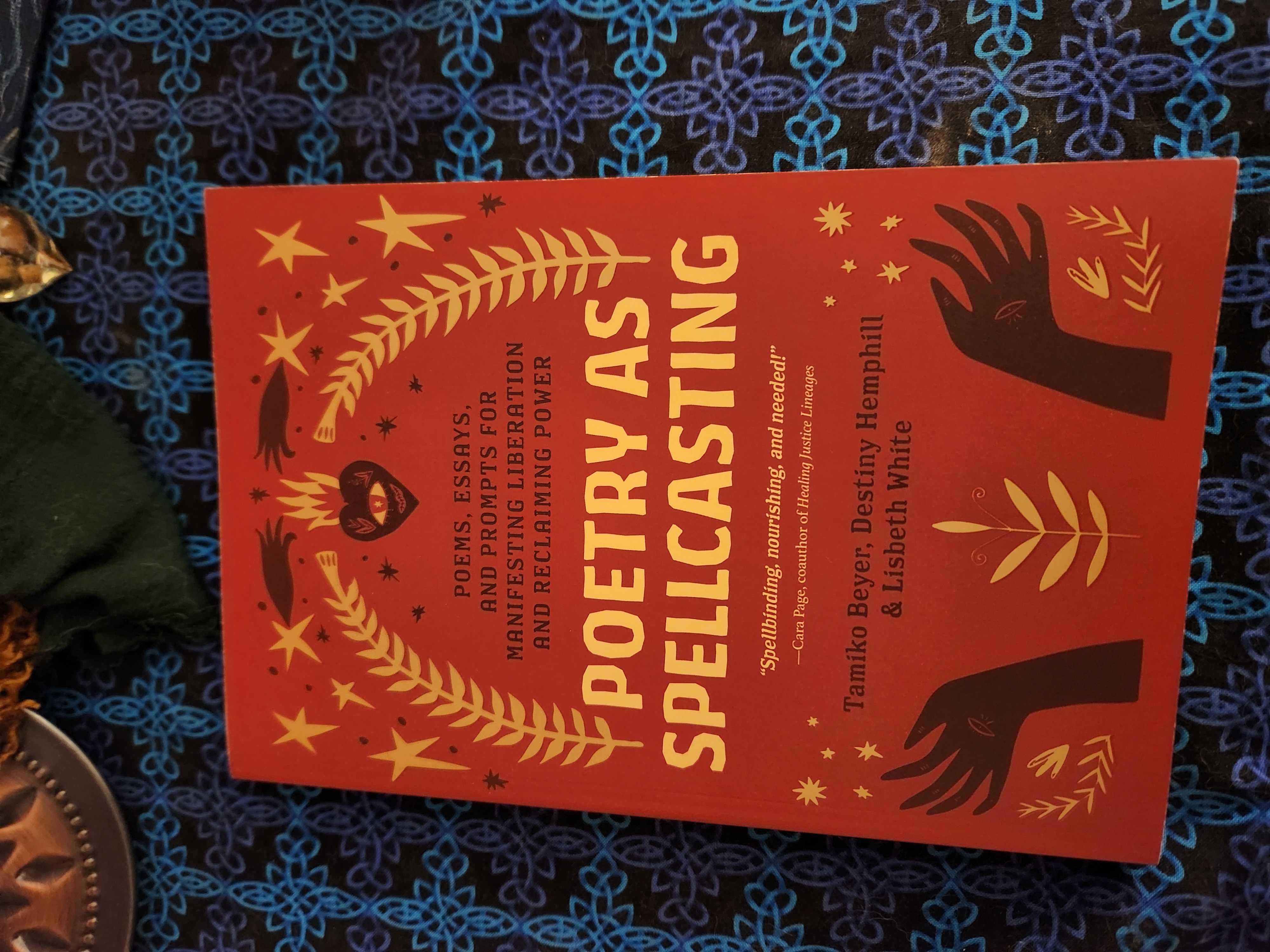A book that fills a niche with poetry, prayer, and rituals from diverse perspectives.

(Image description: A photo of the book. A dark-red cover features a stylized depiction of stars and plants in golden-yellow. A dark-colored pair of upward-facing hands have eyes on the tops of them. Between two curved plants, there is a sacred heart with an eye in the middle. The golden-yellow text reads, Poetry as Spellcasting. Black text above it reads, Poems, Essays, and Prompts For Manifesting Liberation And Reclaiming Power. Three contributors’ names are listed in the middle, Tamiko Beyer, Destiny Hemphill, & Lisbeth White. The book is placed on a cloth with knotwork in two shades of blue.) Credit: My own work.
Poetry as Spellcasting functions as both a poetry anthology and a magical workbook, not neatly fitting into either category as poetic spirit weaves throughout its pages. The book, with contributions from Tamiko Beyer, Destiny Hemphill, Lisbeth White, and many other poets, was published in 2023 through North Atlantic Books.
As mentioned, this work blurs the line between magical prompts and deeply personal poems. In a way, you can learn as much from the poems and essays as you can from the writing prompts. While the authors range in religious practices, cultures, and ethnicities, the format is written intuitively and methodically so that anyone of any background can find something useful and meaningful within it.
The book’s authors are experimental in their respective contributions. Alexis Pauline Gumbs uses Audre Lorde’s biomythography Zami as reflective points and works it into an essay that transcends time between a personal perspective and that of Audre Lorde and her first love, Genevieve.
An interesting concept is conveyed in Laurin DeChae’s essay I Am, with parts of it written in a text collage predominantly with summaries from a Lovecraft Country episode and excerpts from Alexis Pauline Gumbs’s book Spill: Black Feminist Scenes of Fugitivity. It reminded me of how pop culture can be both relatable and magical with regard to identity and personal power.
Kenji C. Liu’s Text of Bliss: Heaping Disruption at the Level of Language features wordplay influenced by Buddhist literature and personal experience as a challenge to Western and English-focused expectations. His etymological breakdown of Japanese words reminded me of Celtic Polytheism’s practices of animism, poetry, and their intermingling and dependence upon another. To quote from Liu’s essay, “To write poetry is to cast a spell.” The animistic perspective continues by relating plants found in the Manyōshū into the poetry of the work, which brings to mind the kennings found within the ogam and its mnemonic trees and plants. That cross-cultural bond made my little polytheist heart very happy.
That theme continues with Hyejung Kook’s Poetry as Prayer though her exploration of her Korean-Catholic background, delving into Anglo-Saxon charms, and Buddhist chants. I really love the contributor’s ability to get to English’s roots and find the magic at its heart. It reminds me some of the healing charms found within Irish and Gaelic folk practices. Also, the connections she finds with her late grandfather shows how poetry can reunite us with our ancestors.
Even with all the rich and magical poems and essays throughout the book, I would be remiss to not discuss some of my favorite writing prompts. It has an introductory ritual of setting up an altar to which you can return to throughout your time working on the prompts, being based around personal symbols to drawn upon your own power. A portion covers a method of writing a letter to yourself, as a way to grief whatever lost part of you there is. I especially loved a ritual for re-enchanting yourself and forming temporary bonds with past memories and the environment around you. All of the writing prompts can be used as a means to contemplate, as they build upon one another.
What stands out most about the book is the variety of contributors. As a monastic, it can be easy to simply focus on your own contemplation. However, every monastic is still tied to the community of the world. You’re more or less still linked with them, even if it’s only briefly. I share some qualities with the contributors, but my ancestors came from Europe and my upbringing is that of an American, White-centered background. There will obviously be situations and feelings I will never live through because of those facts.
However, I can learn from them and reflect upon the ties to the ancestors, my life, and how I can help to improve the world for the better. I feel that Polytheistic Monasticism isn’t just about connecting with nature, the ancestors, spirits, and deities, but also the people and communties around you as a means to deconstruct the issues that plague our world.
Regardless of tradition or background, this book has something you can learn from and incorporate into your practice. It also takes you out of your monastic cell and out into the world, to learn, to listen, and to contemplate from others outside of your personal background through the poetry and essays. The writing prompts allow you to explore aspects that you might not think about otherwise. I give the Poetry as Spellcasting five out five stars.
Leave a Reply